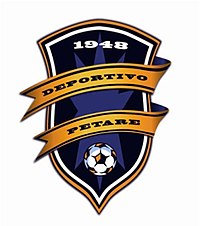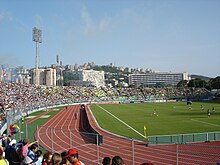Deportivo Petare
| Deportivo Petare | |||

|
|||
| Basic data | |||
|---|---|---|---|
| Surname | Deportivo Petare Fútbol Club | ||
| Seat | Caracas | ||
| founding | 1948 | ||
| president | Mario Hernández | ||
| Website | deportivopetarefc.com | ||
| First soccer team | |||
| Head coach | Daniel De Oliveira | ||
| Venue | Estadio Olímpico | ||
| Places | 24,900 | ||
| league | Primera División | ||
| 2014/15 | 16th place | ||
|
|
|||
Deportivo Petare Fútbol Club (until 2010 Deportivo Italia Fútbol Club ) is a Venezuelan football club from Caracas . The club was founded in 1948 and plays its home games at the Estadio Olímpico de la Universidad Central de Venezuela , which can seat 24,900 spectators. Deportivo Petare, who has been Venezuelan football champion five times, currently plays in the Primera División , the top division in Venezuela .
history
Beginnings
Deportivo Petare was founded on August 18, 1948 under the name Deportivo Italia in Caracas , the capital of Venezuela . The name of the association can be traced back to the Italian origin of the founders Carlo Pescifeltri, Lorenzo Tommasi, Bruno Bianchi, Giordano Valentini, Samuel Rovatti, Angelo Bragaglia, Giovanni de Stefano, Giuseppe Pane and Alfredo Sacchi. The club colors are also chosen based on Italy . Deportivo Italia played in the colors of the Squadra Azzurra , i.e. in blue and white. Nowadays, the club uses the original jerseys for away games, the home jerseys have been made of black and white since the name change to Deportivo Petare in 2010.
The D'Ambrosio era
In 1958 Mino D'Ambrosio took over the management of Deportivo Italia together with his brother Pompeo. With financial support, Pompeo D'Ambrosio owned one of the largest banks in Venezuela, Deportivo Italia was Venezuela's most successful association in the twenty years of leadership by the D'Ambrosio brothers.
Successes in league and cup
Deportivo Italia won the Venezuelan football championship four times during this period. In the sixties alone, the title was won three times. After winning the first title in 1961, Deportivo Italia repeated the championship two years later by winning the final against Deportivo Portuguesa, today's Portuguesa FC , after tied on points at the end of the championship, which was played in league mode. 1966 Deportivo Italia became Venezuelan football champions for the third time. Again, Deportivo Portuguesa was relegated to second place in the table. It was not until 1972 that Deportivo Italia was able to win the national championship again after three runners-up in 1968, 1970 and 1971, this time they were in first place in the table before Deportivo Galicia . The 1972 season was Deportivo Italia's last successful national championship for a long time, followed by 27 years without a title. The successes in the Copa Venezuela now failed. Previously, Deportivo Italia had won Venezuela's national cup competition three times in 1961, 1962 and 1970.
The Pequeno Maracanaço
Thanks to its success at national level, Deportivo Italia was also able to take part in the Copa Libertadores , the most important competition for club teams in South America, several times . At the Copa Libertadores in 1971 they met Fluminense Rio de Janeiro in the group stage . After losing the first leg in Caracas 6-0, they went to Rio de Janeiro as a big underdog . In the legendary Maracanã Stadium , where Uruguay once won the world championship title as a blatant underdog against Brazil in the decisive final round game at the 1950 World Cup known as Maracanaço , Deportivo Italia won against the Fluminense team, trained by Brazil’s world champion coach Mário Zagallo , with a goal from Tenorio with 1: 0. Due to the surprise of this victory at the location of one of the previously greatest surprises in the history of the World Cup, the victory of Deportivo Italia over Fluminense as Pequeno Maracanaço , in German Little Maracanaço, went down in the history of Venezuelan football. It was not enough to advance, as this victory was the only one in this competition for Deportivo Italia, but the opponent from Brazil failed after the defeat, as the previously believed first place in the table had to be surrendered to Palmeiras São Paulo.
Two years earlier, Deportivo Italia had managed a surprise in the Copa Libertadores. At the 1969 tournament, the club sensationally survived the group stage in second behind Deportivo Cali from Colombia . This second place qualified for participation in the second group stage, where Deportivo Italia was last behind CD Universidad Católica from Chile and Club Cerro Porteño from Paraguay . Reaching the second group stage at the Copa Libertadores 1969 remains the only excursion by Deportivo Italia to the second round of the continental competition to this day, with nine other participations ending up in the first round or already in qualification. Also in the two appearances in the Copa Sudamericana , 2003 and 2004 , they did not get beyond the qualifying round.
Time of few successes

The era of the D'Ambrosio brothers ended in 1978. With the exit of the club management, the successful time of Deportivo Italia also ended. After a few years in midfield of the Venezuelan league, the name of the club was changed; from August 1998 it was called Deportivo Italchacao Fútbol Club . In 1999, Deportivo Italchacao won the last Venezuelan championship to date for today's Deportivo Petare. But the new name was not kept for long either, in 2006 it was renamed Deportivo Italia. In 2008/09, Deportivo Italia won the Torneo Apertura under the leadership of coach Eduardo Saragó, which qualified for participation in the Copa Libertadores 2010 , where Deportivo Italia was the only point to win a draw against Cruzeiro Belo Horizonte .
Current development
The club has been called Deportivo Petare since summer 2010. You currently play in the first Venezuelan football league, the Primera División Venezolano, where you took third place in the 2010 Apertura.
successes
- Primera División : 5 × (1961, 1963, 1966, 1972, 1999)
- Copa Venezuela : 3 × (1961, 1962, 1970)
Known players
-
 Gilberto Angelucci
Gilberto Angelucci
-
 Raúl González Guzmán
Raúl González Guzmán
-
 Hugo Maradona
Hugo Maradona
-
 Dušan Maravic
Dušan Maravic
-
 Stalin Rivas
Stalin Rivas
-
 Renny Vega
Renny Vega
-
 Leonel Vielma
Leonel Vielma

